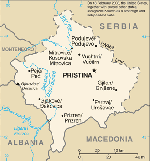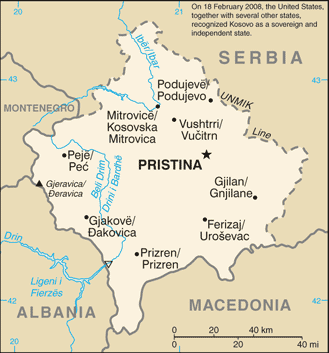 Kosovo
Kosovo
Country Specific Information
On this page » |
|
March 12, 2008
COUNTRY DESCRIPTION:
 Kosovo declared independence from Serbia on February 17, 2008, and the United States recognized Kosovo as an independent
state on February 18, 2008. The UN Interim Administration Mission in Kosovo (UNMIK), pursuant to U.N. Security Council Resolution
1244, continues to provide support during the transition period, as the International Civilian Office, European Rule of Law
Mission (EULEX), and NATO (KFOR) prepare to supervise Kosovo’s independence. At this time, some civilian institutions, including
the criminal justice system, are not functioning at a level consistent with Western standards. Kosovo is a cash economy.
The currency used throughout Kosovo is the euro.
Kosovo declared independence from Serbia on February 17, 2008, and the United States recognized Kosovo as an independent
state on February 18, 2008. The UN Interim Administration Mission in Kosovo (UNMIK), pursuant to U.N. Security Council Resolution
1244, continues to provide support during the transition period, as the International Civilian Office, European Rule of Law
Mission (EULEX), and NATO (KFOR) prepare to supervise Kosovo’s independence. At this time, some civilian institutions, including
the criminal justice system, are not functioning at a level consistent with Western standards. Kosovo is a cash economy.
The currency used throughout Kosovo is the euro.
ENTRY/EXIT REQUIREMENTS: U.S. citizens need a passport to enter Kosovo. No visa is required, but visitors may be required to produce documentation
to demonstrate the purpose of their visit. Generally, visitors allowed to enter Kosovo will be permitted to stay for up to
90 days. Persons who wish to prolong their stay beyond 90 days will need to register at the Office for Registration of Foreigners,
located in the Main Police Headquarters in Pristina.
Entry to Serbia from Kosovo should not be attempted without a valid Serbian visa and entry stamp from a Serbia border crossing
post. Serbia does not recognize entry stamps by Kosovo border authorities at Kosovar ports of entry, including Pristina Airport,
as valid. For more information on current regulations on the movement of people, see http://www.unmikonline.org/misc/FAQ_Movement_ofPersons.htm.
Information about dual nationality or the prevention of international child abduction can be found on our web site. For further information about customs regulations, please read our Customs Information sheet.
SAFETY AND SECURITY: The NATO-led Kosovo Force (KFOR) along with international and local police, are responsible for security and stability in Kosovo. Although the overall security situation has improved, inter-ethnic tensions and sporadic incidents of violence continue to occur. Following the February declaration of independence, violent incidents occurred at border crossings between the Republic of Kosovo and Serbia. Per standing security instructions, U.S. Government officials may only travel to parts of northern Kosovo for official business and these restrictions remain in place.
Americans should avoid demonstrations and other sites, such as roadblocks, where large crowds are gathered, particularly those involving political/ethnic causes. Even demonstrations intended to be peaceful have the potential to turn into confrontational situations and possibly escalate into violence.
While de-mining programs have proven effective, unexploded ordnance and mines remain in some areas. The reliability of telecommunications, electric and water systems remains unpredictable.
For the latest security information, Americans traveling abroad should regularly monitor the Department of State, Bureau of Consular Affairs’ web site at http://travel.state.gov, where the current Travel Warnings and Travel Alerts, as well as the Worldwide Caution, can be found.
Up-to-date information on safety and security can also be obtained by calling 1-888-407-4747 toll free in the U.S. and Canada,
or for callers outside the U.S. and Canada, a regular toll-line at 1-202-501-4444. These numbers are available from 8:00
a.m. to 8:00 p.m. Eastern Time, Monday through Friday (except U.S. federal holidays).
The Department of State urges American citizens to take responsibility for their own personal security while traveling overseas.
For general information about appropriate measures travelers can take to protect themselves in an overseas environment, see
the Department of State’s pamphlet A Safe Trip Abroad.
CRIME: High unemployment and other economic factors have encouraged criminal activity. Street crimes, in particular theft and purse snatchings, are serious problems in Kosovo, especially Pristina. It is not unusual for criminals to commit crimes while armed, especially with handguns. Foreigners can be targets for crime, as they are assumed to carry cash. Likewise, foreigners’ homes, vehicles and international non-governmental organization (NGO) offices have been subject to burglaries. The loss or theft of a U.S. passport should be reported immediately to the nearest police station and to U.S. Embassy Pristina. While U.S. Embassy Pristina does not have the ability to issue new passports at this time, it will assist with arrangements for applying for a new passport at the U.S. Embassy in Skopje, Macedonia. Emergency numbers in Pristina are Police: 92; Fire Department: 93; and Ambulance: 94. For information on other areas contact U.S. Embassy Pristina.
The civilian police force is a contingent of international officers who are working alongside local officers to carry out
most normal police functions. The judicial system is still developing under the oversight of the civilian mission, UNMIK.
INFORMATION FOR VICTIMS OF CRIME: The loss or theft abroad of a U.S. passport should be reported immediately to the local police and the nearest U.S. Embassy or Consulate. If you are the victim of a crime while overseas, in addition to reporting to local police, please contact the nearest U.S. Embassy or Consulate for assistance. The Embassy/Consulate staff can, for example, assist you to find appropriate medical care, contact family members or friends and explain how funds could be transferred. Although the investigation and prosecution of the crime is solely the responsibility of local authorities, consular officers can help you to understand the local criminal justice process and to find an attorney if needed.
See our information on Victims of Crime.
MEDICAL FACILITIES: Health facilities are limited, and medications are in short supply. KFOR cannot provide basic health care to non-military
personnel, nor can they provide medical evacuation out of Kosovo.
Information on vaccinations and other health precautions, such as safe food and water precautions and insect bite protection,
may be obtained from the Centers for Disease Control and Prevention’s hotline for international travelers at 1-877-FYI-TRIP
(1-877-394-8747) or via the CDC’s web site at http://wwwn.cdc.gov/travel/default.aspx. For information about outbreaks of infectious diseases abroad consult the World Health Organization’s (WHO) web site at
http://www.who.int/en. Further health information for travelers is available at http://www.who.int/ith/en.
MEDICAL INSURANCE: The Department of State strongly urges Americans to consult with their medical insurance company prior to traveling abroad
to confirm whether their policy applies overseas and whether it will cover emergency expenses such as a medical evacuation.
Please see our information on medical insurance overseas.
TRAFFIC SAFETY AND ROAD CONDITIONS: While in a foreign country, U.S. citizens may encounter road conditions that differ significantly from those in the United
States. The information below concerning Kosovo is provided for general reference only, and may not be totally accurate in
a particular location or circumstance.
Road conditions can be extremely hazardous because roads are narrow, crowded, and used by a variety of vehicles, from KFOR
armored personnel carriers to horse-drawn carts. Many vehicles are old and lack standard front or rear lights. Mountain
roads can be narrow, poorly marked, and lack guardrails. They quickly become dangerous in inclement weather.
The use of seat belts is mandatory. A driver with a blood alcohol level higher than 0.05 is considered intoxicated. Travelers
entering Kosovo by road should be aware that the purchase of local third-party insurance is required.
AVIATION SAFETY OVERSIGHT: Since Kosovo’s recent independence, the U.S. Federal Aviation Administration (FAA) has not separately assessed the Government
of Kosovo’s Civil Aviation Authority for compliance with International Civil Aviation Organization (ICAO) aviation safety
standards. However, the FAA earlier assessed the Governments of Serbia and Montenegro’s Civil Aviation Authority as not being
in compliance with ICAO standards for oversight of Serbia and Montenegro’s air carrier operations. For more information,
travelers may visit the FAA’s web site at http://www.faa.gov/safety/programs_initiatives/oversight/iasa.
SPECIAL CIRCUMSTANCES: Banking services are available in Pristina and other major towns, although they are not fully developed. There are now
a number of banks with international ties that offer limited banking services, including Automated Teller Machines (ATMs),
in Pristina and other major towns. If it becomes necessary to receive emergency funds from abroad, Western Union has offices
throughout Kosovo.
CRIMINAL PENALTIES: While in a foreign country, a U.S. citizen is subject to that country's laws and regulations, which sometimes differ significantly
from those in the United States and may not afford the protections available to the individual under U.S. law. Penalties
for breaking the law can be more severe than in the United States for similar offenses. Persons violating Kosovo laws, even
unknowingly, may be expelled, arrested or imprisoned. Penalties for possession, use, or trafficking in illegal drugs in Kosovo
are severe, and convicted offenders can expect long jail sentences and heavy fines. Engaging in sexual conduct with children
or using or disseminating child pornography in a foreign country is a crime, prosecutable in the United States. Please see
our information on Criminal Penalties.
CHILDREN'S ISSUES: For information see our Office of Children’s Issues web pages on intercountry adoption and international parental child abduction.
REGISTRATION / EMBASSY LOCATION: Americans living in or traveling in Kosovo are encouraged to register with the nearest U.S. Embassy or Consulate through
the State Department’s travel registration web site, and to obtain updated information on travel and security within Kosovo. Americans without Internet access may register
directly with the nearest U.S. Embassy, Consulate, or Office. By registering, American citizens make it easier for the Embassy,
Consulate, or Office to contact them in case of emergency. U.S. citizens are encouraged to register with U.S. Embassy Pristina
and obtain updated information on travel and security in Kosovo. At this time U.S. Embassy Pristina provides only emergency
services to American citizens. U.S. Embassy Skopje, Macedonia, provides all routine consular services such as passport and
visa processing. The Embassy is located at 30 Nazim Hikmet St. in the Dragodan area of Pristina. The telephone number is
(381) 38-5959-3000, e-mail: consularpristina@state.gov. The web site is http://pristina.usmission.gov/.
* * *
This Country Specific Information is new and replaces the Kosovo section of the Serbia Country Specific Information dated
September 20, 2007.

